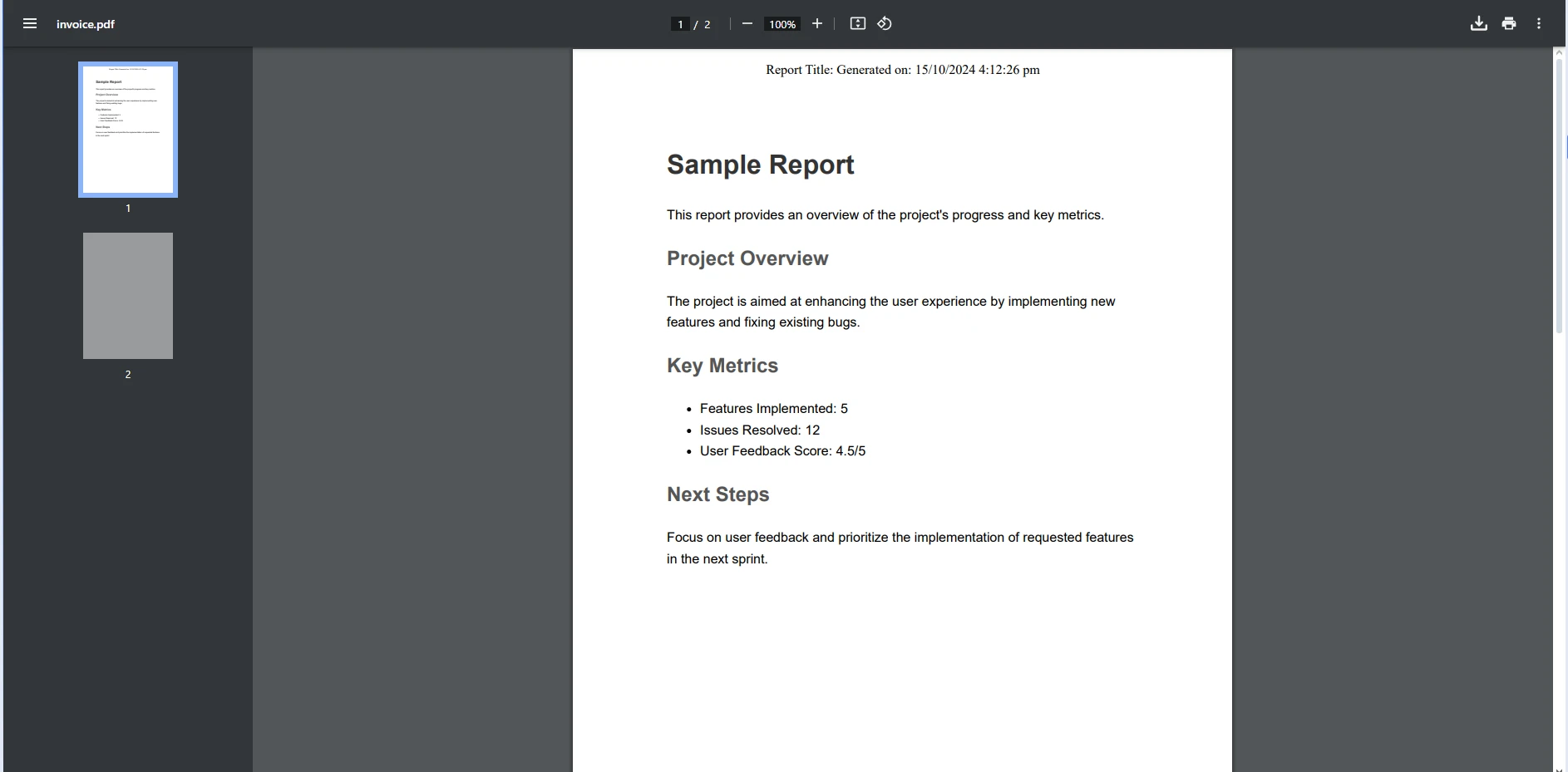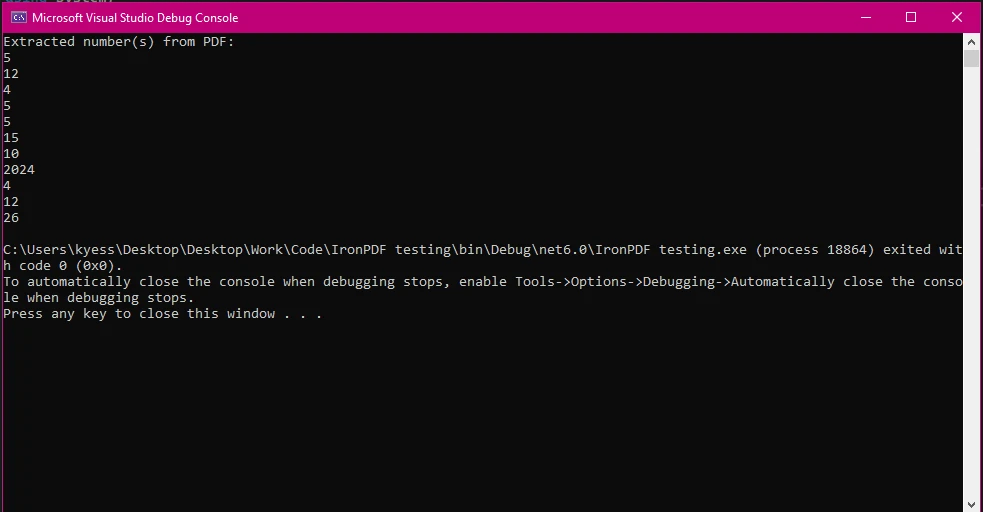Test in production without watermarks.
Works wherever you need it to.
Get 30 days of fully functional product.
Have it up and running in minutes.
Full access to our support engineering team during your product trial
In .NET development, converting between different data types is an essential skill, especially when dealing with common types like strings and integers. One of the most frequent operations you’ll perform is converting a string variable to an integer value. Whether handling numeric strings from user inputs, files, or databases, being able to efficiently convert string variables to integers is crucial. Luckily, C# offers various methods to perform these conversions effectively, thanks to the int.Parse() and int.TryParse() methods.
On the other hand, when working with PDFs, the ability to extract and manipulate text data becomes even more important, especially when dealing with documents like invoices, reports, or forms that often contain integer strings. This is where IronPDF comes in—a powerful and easy-to-use library for working with PDFs in .NET. In this article, we’ll walk through both how to convert strings to integers in C#, and how IronPDF can help you handle PDF-related tasks within your .NET projects.
String-to-integer conversions are a critical step in many applications where numerical data is provided as a string. Here are some common use cases:
There are several ways to convert a string variable to an integer value in C#. The most common approaches include the Parse method, the TryParse method, and the convert class.
The int.Parse() method is a straightforward way to convert a string to an integer. However, it assumes that the input string is in the correct format (i.e., a valid number) and will throw a FormatException if the conversion fails.
int number = int.Parse("123");int number = int.Parse("123");Dim number As Integer = Integer.Parse("123")Advantages:
Simple and direct for valid string inputs. Disadvantages:
For safer conversions, TryParse method is commonly used. It attempts the conversion and returns a boolean value indicating whether the conversion was successful or not. If the conversion fails, it does not throw an exception but simply returns false. The result is stored in an out parameter.
bool success = int.TryParse("123", out int result);bool success = int.TryParse("123", out int result);Dim result As Integer
Dim success As Boolean = Integer.TryParse("123", result)Here, success is a boolean value indicating whether the conversion succeeded, and number is the converted integer, stored in the out parameter.
Advantages:
Ideal for scenarios where you are unsure if the string is a valid number. Disadvantages:
Another way to convert a string variable into an integer value is to use the convert class. The convert class includes methods that can convert different data types, including strings to integers.
int number = Convert.ToInt32("123");int number = Convert.ToInt32("123");Dim number As Integer = Convert.ToInt32("123")Advantages:
The convert class can handle a wider range of data types beyond just strings and integers. Disadvantages:
When working with PDFs, you may need to extract and process any integer string embedded in the document. IronPDF simplifies PDF manipulation, allowing you to extract text and numbers seamlessly. This can be especially useful in scenarios where you need to extract and convert invoice numbers, quantities, or other important data.
IronPDF offers a comprehensive set of features for working with PDFs, including:
These features make IronPDF a powerful tool for any application that requires PDF functionality, from simple reports to complex document processing systems.
One of the key scenarios where string-to-integer conversion and PDF handling come together is when you need to extract numerical data from PDFs. For example, you may want to extract invoice numbers, order IDs, or quantities from a PDF document, which often come in as strings. In this next example, we will demonstrate how to extract text from a PDF using IronPDF and convert any integer strings into integer values using the TryParse method.
Using IronPDF, you can extract text from a PDF and then convert any numerical strings into integers using int.TryParse(). Here’s how:
public static void Main(string[] args)
{
PdfDocument pdf = PdfDocument.FromFile("invoice.pdf");
// Extract text from the PDF
string extractedText = pdf.ExtractAllText();
// Use regex to extract potential numbers from the text
var matches = Regex.Matches(extractedText, @"\d+");
if (matches.Count > 0)
{
Console.WriteLine("Extracted number(s) from PDF:");
foreach (Match match in matches)
{
if (int.TryParse(match.Value, out int num))
{
Console.WriteLine(num);
}
}
}
else
{
Console.WriteLine("Could not find any numbers in the extracted text.");
}
}public static void Main(string[] args)
{
PdfDocument pdf = PdfDocument.FromFile("invoice.pdf");
// Extract text from the PDF
string extractedText = pdf.ExtractAllText();
// Use regex to extract potential numbers from the text
var matches = Regex.Matches(extractedText, @"\d+");
if (matches.Count > 0)
{
Console.WriteLine("Extracted number(s) from PDF:");
foreach (Match match in matches)
{
if (int.TryParse(match.Value, out int num))
{
Console.WriteLine(num);
}
}
}
else
{
Console.WriteLine("Could not find any numbers in the extracted text.");
}
}Public Shared Sub Main(ByVal args() As String)
Dim pdf As PdfDocument = PdfDocument.FromFile("invoice.pdf")
' Extract text from the PDF
Dim extractedText As String = pdf.ExtractAllText()
' Use regex to extract potential numbers from the text
Dim matches = Regex.Matches(extractedText, "\d+")
If matches.Count > 0 Then
Console.WriteLine("Extracted number(s) from PDF:")
For Each match As Match In matches
Dim num As Integer
If Integer.TryParse(match.Value, num) Then
Console.WriteLine(num)
End If
Next match
Else
Console.WriteLine("Could not find any numbers in the extracted text.")
End If
End SubInput PDF

Console Output

In this code example, we start by loading the PDF file named "invoice.pdf" and before extracting all of the text from the document using the ExtractAllText() method. To identify potential numbers within the extracted text, the code applies a regular expression (regex) \d+, which matches sequences of digits.
The matches are stored, and if any numbers are found, they are displayed on the console. Each match is individually parsed as an integer using int.TryParse(), ensuring only valid numeric values are processed. If no numbers are found, a message is displayed stating that no numbers were extracted. This approach is useful for processing PDFs containing numeric data, such as invoices, where extracting and converting numbers is essential.
Here are some scenarios where converting extracted PDF text to integers can be valuable:
Converting strings to integers is a fundamental skill in C#, especially when working with external data sources. The int.Parse() and int.TryParse() methods provide flexible ways to handle these conversions, ensuring both simplicity and safety.
Meanwhile, IronPDF empowers .NET developers to handle complex PDF workflows with ease. Whether you’re extracting text, creating dynamic reports, or converting PDF data into usable formats, IronPDF is a valuable addition to your development toolkit.
Want to try IronPDF for yourself? Start your free trial today and experience how IronPDF can transform the way you handle PDFs in your .NET applications!